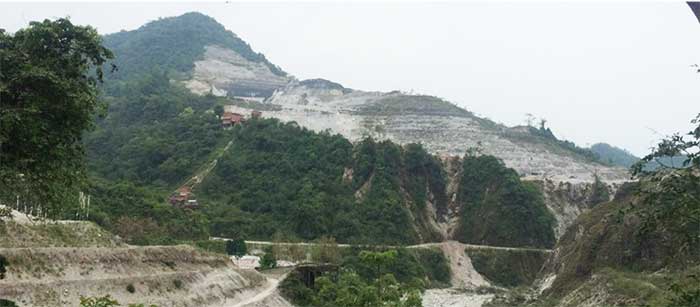State Mining Corporation to mine dolomite for the time being
Rinzin Wangchuk
In what came as a big blow to the prospective bidders, the government has cancelled auctioning the Chunaikhola dolomite mining rights, which was scheduled to conduct in Thimphu today.
The cancellation of auction of rights to mine dolomite in Pugli, Samtse, comes after the economic affairs ministry deferred the auction two times. Initially, the auction was scheduled for April 15 as the lease period of the mine expired last month. However, it was deferred to May 20 and then to June 3.
In a letter sent to the prospective bidders yesterday, Economic Affairs minister Loknath Sharma stated that while all arrangements have been made to auction the mine, the ministry in accordance with the directives received from Prime Minister on June 1 regrets to inform that the auction of the dolomite mine is cancelled in view of the Covid-19 exigency.
“We are aware of the efforts and hard work that has been undertaken to participate in the auction and assure that the ministry will continue to provided full support and co-operation in your business endeavours, and will keep you informed,” Lyonpo Loknath Sharma stated.
Lyonchhen Dr Lotay Tshering asked the MoEA to discuss with State Mining Corporation Ltd. (SMCL) to look into the operations of the mine to ensure minimum business activity to keep the service afloat in the interim period after the present lease expires.
Government’s stand
In his letter to the economic minister, Lyonchhen stated that the health and economic burden of the Covid-19 pandemic, like for any government worldwide, is weighing heavier by the day on the royal government. Governments around the globe have been unable to undertake major activities as they are encumbered by Covid-19 response measures. “The situation looks grim for Bhutan too, particularly with the recent hike in positive cases both within and outside Bhutan,” Lyonchhen stated.
On the economic front, according to Lyonchhen, businesses are going through their worst times with increasing incidences of companies filing bankruptcy, job losses and closures. “Bhutan, at this stage, is also in the highest level of preventive mode which has inevitably affected business, and in the unfortunate event of Covid-19 community transmission, restriction on business activities will be even more stringent,” he said. “And, this point in time, how long the Covid-19 situation will perpetuate cannot be foreseen.”
Given these unavoidable health and economic dynamics, Lyonchhen stated that the likelihood of auctioning the mine as a profitable venture for both the private sector and the government appears slime, and this has compelled to reconsider the timeline.
The MoEA announced the auction of mining license before the expiry of the current lease period. The government intends to auction the mine before the expiry of the lease to ensure business continuity.
A total of 10 prospective bidders were supposed to participate in the auction. If the government decides to auction the dolomite mines it would generate some billions in revenue. “However, the Covid-19 is likely to delay the auction and the government has decided to allow SMCL to operate the mines for the time being,” Lyonpo Loknath told Kuensel.
15 individuals and companies, including Jigme Mining Corporation Limited (JMCL), which completed 15 years mining lease period on May 14, submitted their bidding documents to participate in the auction. However, five applicants were reportedly disqualified for not fulfilling the eligibility criteria set by the ministry.
The Chunaikhola mines
The deposit of Chunaikhola dolomite was mined by JMCL for a period of 15 years since May 15, 2005 till May 14, 2020 with a total bid value of Nu 390 million. JMCl was formed by Lhaki Group as a public company after winning the mining rights.
The Department of Geology and Mines (DGM) had undertaken geological reassessment of Chunaikhola dolomite deposit during the financial year 2018-19 to map the dolomite band in detail within present mining area and outside mining area till Titi river in the east to prove the reserve and grade of the dolomite and determine the long-term mining potential of the deposit.
Chunaikhola dolomite mine is one of the biggest opencast mines in the country that contributes substantial revenue to the country. Its direct gross revenue contribution to government from 2005 to 2018 was Nu 3.159 billion, beside corporate social responsibility contribution of Nu 21.437M, dividend declaration of Nu 991.624M, Environmental Restoration Bond (ERB) of Nu 79.115M, direct employment of 211 nationals (189 male and 21 female) and indirect employment of 376 nationals.
The main market for dolomite of Chunaikhola are Indian steel and allied sectors including refractories. The lumps and chips are mostly used as a flux in steel plants, ferro alloys plants and sponge iron plants.
As per the geological reassessment report 2019, the study area has proven dolomite geological reserve of 662.58M metric tonnesupto an elevation level of 420m as of mid-May 2019. Considering 15 to 20 percent average increase in annual mine production from 2018 mine production rate of 3M metric tonnes of dolomite, the deposit is expected to last 189 years.
Dolomite is originally formed by post-depositional alteration of lime mud and limestone by magnesium-rich groundwater under diagenesis process. It is a common sedimentary rock forming mineral composed of calcium magnesium carbonate.
In Bhutan occurrence of huge dolomite deposits are well known within Manas Formation of Lesser Himalayan Sequence (LHS), belong to Baxa Group of rocks. Detailed exploration of the dolomite deposit was previously carried out in 1975-1976 by Geological Survey of India (GSI) between Pugli river and summit of the dolomite hill covering an area of 98.84 acres on the scale of 1:2000 and drilling of 21 boreholes.


